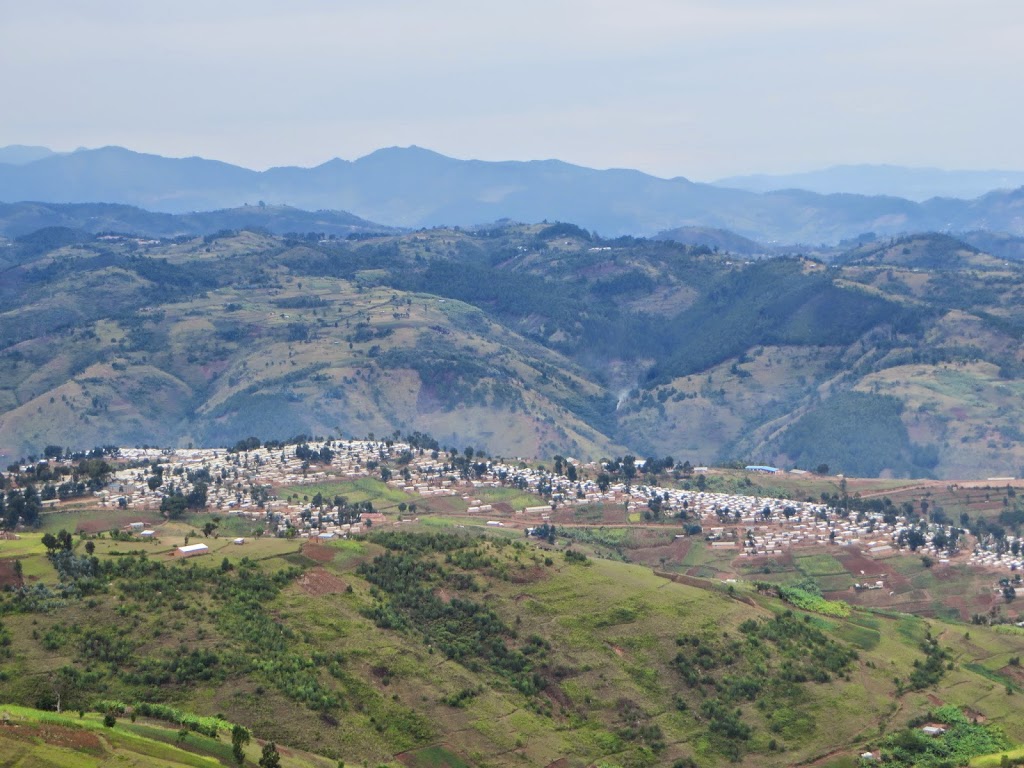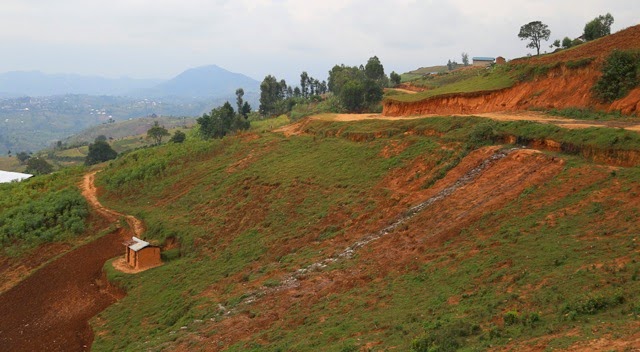 |
| Kiziba Refugee Camp (some parts missing) |
In the spirit of keeping my posts to manageable lengths, I’ve broken this one day into three parts (who am I kidding, it’s still going to be long), so bear with me as I try to group the day’s events into sections…
If yesterday was “deep fieldwork immersion,” today was “even deeper fieldwork immersion.” Our friends greeted us at the usual meeting place in the camp around 9 am and informed us that there was a whole section of the camp we’d never been to. That’s not surprising considering it covers an entire mountainside. But, to our surprise, we were told that the best way to get there is by car. By car?? I can’t even picture where we’re going. We all jump in the SUV and turn down a road I had honestly never even noticed before, let alone observed that a car would fit down it. Around the mountain we wound, traversing the very border of the camp. I think sometimes the image of a “refugee camp” carries with it some sort of containment, but the “border” here is simply the place where cramped housing stops and farmland begins. There are no fences, walls, or signs. They just know that they can go no farther. So we drove about 15 minutes down a rocky, steep red road that led us to an entirely different section of the camp. There, in the only spot to put the car, we got out and our friends asked around about meeting more village leaders. Women gathered at the huge cement washing station and churned clothing in suds while mist hung all around us on the mountaintops. In this surreal environment, deep in the recesses of this camp, we watched as neighboring Rwandans brought their cows in to drink at the refugees’ water wells—a testament to their ability to live in harmony—and a baby screamed as its mother tried to wash it with the laundry.
Apparently this wasn’t deep enough into the camp, so we were motioned to follow our friend down a thin winding path between the houses that led down to another, more remote village. The path was steep and twisted past the doorways of people going about their business. If you missed a step, you might fall right inside someone’s home. At about halfway, we saw what looked like a wooden closet on stilts standing in a small space between the houses. With the words “Word Vision” (they forgot the ‘L’) painted across the front, a man unlocked the padlocks to reveal 20 bunny faces peering out from the dark. Raising rabbits for meat and trade is one of the widow projects started by a nonprofit inside the camp recently. They beamed and showed me how you pick rabbits up by their ears. The privileged Westerner inside me cringed at the ear pulling and lack of airflow—but they were so proud, so we all took pictures and commented on how many they had raised. Moving along, we continued down at an angle that made me comment, “Can you imagine what it’s like around here when it rains??” Some of the sewage pipe was broken along the way, so the trench we straddled as we made our way down looked like it would fill with some pretty…uhh…gross stuff if train flowed down it.
At the bottom, just at the edge of the mountain and the very, very furthest tippy tip of the camp, we sat down on wooden benches that again appeared out of every home and prepared to speak with two men leaders who had agreed to speak with us. One Direction’s “The Story of My Life” wafted over radio waves from some nearby house. It reminded me that the first time we came to the camp, we were surprised to hear Beyonce booming over the radio along the main street. Then more people showed up, and others forfeited their seats to them. Then an audience gathered to the side, giving the leaders their space, but close enough to hear the questions. Our guide is incredibly savvy at both translating and navigating social spaces, so while we prepared, he entertained them with stories in Kinyarwanda. I don’t know what he said, but they laughed and felt at ease as we moved into our interviews. About 30 minutes in, giant raindrops began to fall from the sky. We all pretended that we didn’t notice, but the skies opened up and it began to pour. Having accumulated 5 neighborhood leaders, one of whom is one of just two women leaders at the level just below the camp president, we crammed into a room to keep everyone (minus the audience) together without losing the opportunity to speak with any of them. We had an amazing time interviewing them, particularly the high-ranking woman, and heard incredible stories of survival. One of the great revelations about language that came up was in our instinct to ask them at the end of the interviews if they had any questions for us. In Kinyarwanda, apparently this is like asking if there’s anything you can do for someone, so they would often ask how we planned to change their lives or what kind of guarantee we could give that we would be good ambassadors. These are tough questions and speak to larger issues about power and the role of academics in the lives of everyday people, particularly those we are researching. (More about that in my dissertation—the rest of this post is about my brush with death…)
After several hours of talking—and luckily allowing the rain to subside—we ventured out to make our way back to the car. First, not without a stop at the potty. The leaders all discussed together which we should be allowed to use, and finally they decided we would use one that was farther away—the newer, all cement one. My professor and I have been discussing writing some articles along the theme of “the places we pee” and this will definitely make the list. It was relatively clean, but a spider in my stall about the size of my fist had created a tunnel at the end of a hammock of web that could’ve caught a small mouse. I wasn’t too thrilled about that. We left all of our life possessions (passport, money, phone) with the woman leader while we ventured in, which worked out fine. And afterward she ordered another to gather water from the cistern to “flush” after us. Definitely not the worst toileting facility I’ve seen in the camp.
 |
| Not the best shoes for mud… |
We followed the leaders and our guides back up a different trail to the car. They billy-goated across slippery sloped trenches and over rivers of…umm…stuff…while we grasped desperately onto sides of buildings and lonely trees standing between houses so as not to fall. The woman leader grabbed one hand, and another woman village leader grabbed another and led me up the path. At one point I was certain that my slipping and sliding would take her down, but at that moment I slipped a little and she tucked my whole arm under hers, locked it tight, and I realized that even with the way I towered over her, she was solid as a rock. We managed this way until we got back to the car—what seemed like ages of slipping and layers of mud that got so thick they peeled back off again so more could stick to my shoes. At some point, near the top while I was scolding myself for not wearing more appropriate shoes, I looked down and noticed that she was wearing neon green jellies. I guess “appropriate” is relative.
At the car, we said our goodbyes and our driver began to navigate the path back up to the center of the camp. It was still sprinkling, but the bulk of the rain had already fallen. He slowly moved the SUV along, finally switching into 4-wheel-drive to pull us out of rain engulfed trenches that had formed along parts of the road. The car started to slide a little—laterally—as we made our way along. We all said “Whoa” and let out a collective nervous laugh, but we were only halfway joking. The mountains in Rwanda are steep—not like you see on the east coast of the US, like the kind of steep you see in Hawaii where volcanoes push up from the black and red earth. We bumped along. I offered some crackers to our fellow passengers to try to distract myself from the “view.” More maneuvering. More bumping. And then, we bumped, we slid, the back slid, the front stopped and the back kept slipping. We drifted in what felt like slow motion in a leftward oblique line to the road. I’m pretty sure we were slipping in the sludge of the sewage that drained from the camp toilets above. In the back left seat of the SUV, I watched as the edge got closer and closer. Inches were left as the back tire caught on a tiny piece of grass and slurped to a halt. I think a river of poo nearly killed me. I’ve done lots of sketchy travel things in my life, but I was pretty sure at that moment I was going to die. We opted to get out and walk the rest of the way. My professor was reluctant to leave the driver alone to navigate the treacherous path, but in the end he told us it was for the better. Though I don’t remember it, I nearly jumped into the person’s lap next to me and said, “I came to Rwanda to do research, not to die.” I was making the driver nervous. My professor’s air braking and handle-grabbing was distracting him. It was better for all of us if we just climbed the mountain on foot.
 |
| The river of poo that nearly killed us |
I’m not very fit, certainly not at high altitudes, and I huffed and puffed my way up the mountain, all while answering questions from a curious friend about what life was like in America. It was a serious reality check for him, so while he pondered my responses, I tried to catch my breath between “Good morning!”s to children passing by. As we neared the top, just under a gaggle of school children, my professor raced ahead to capture the image of my fieldwork journey. She yelled “Stop!” and I slid and yelped as my friend tried to catch me. A near-death experience, a trek up a muddy path while straddling a river of who knows what, and I fall on a wide mountain path in front of a bunch of kids. I guess it could be worse, and at this point in a trip I’ve usually lost all sense of self-consciousness anyway, but she got some great action shots of my graceful descent into red mud! All of this and it’s only noon.

your posts are long, indeed. But, hey I needed a break from writing – so, here I am reading your incredible stories….. and did I just read 'a river of poo' OMG!!! I am glad you are safe!!
I love you so much. I love this story. It has a particular, storytelling flow to it with such great images and moments–it really mirrors the experience! And what an experience, Erika. I never know what to say here, but wow. Just wow.